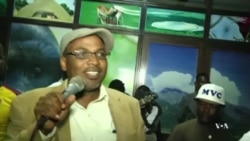STATE DEPARTMENT —
Human Rights Watch says the United States should cut back security assistance to Uganda in response to the country's new anti-gay laws. Several European countries have already suspended aid over tougher criminal penalties for homosexuality, but the Obama administration says it is still considering how best to respond.
Supporters of Uganda's new anti-gay law - which can lead to life in prison for homosexual activity - say Washington should stay out of the country's affairs.
"Somebody go tell Barack Obama: 'Africa says no. Africa says no to sodomy," said Pastor Martin Ssempa. "We only know one way to love - a man marrying a woman.'"
Some in the LGBT (Lesbian, Gay, Bisexual, and Transgender) community are leaving Uganda in fear.
The new law has far broader consequences for the country, says Human Rights Watch's Sarah Margon.
"We see the space for independent actors, activists, and civil society closing very quickly," she said.
The World Bank moved quickly to postpone a $90 million loan to Uganda. But the Obama administration says it is still considering how it might respond so as not to hurt the Uganadan people.
"A lot of the aid that we provide goes to ensure services for things like lifesaving health and medication for HIV/AIDS, to bring justice to those responsible for atrocities, like the [rebel] LRA [Lord's Resistance Army]," said State Department Spokeswoman Jen Psaki. "So we want to make sure that actions we take don’t have a detrimental impact on the Ugandan people who need those health services."
Margon says it is time the U.S. linked human rights with Ugandan security assistance.
"There's been a lot of condemnatory statements. The time has kind of passed for that," she said. "The U.S. needs to actually take some concrete actions. One of the things we've been talking about is looking at U.S. assistance to the police and security forces, given that they are going to be the ones tasked with implementing the law."
Uganda remains defiant in the face of Western pressure over the anti-gay law.
"It is an attempted blackmail which the Western world has employed on the Africans for the last two centuries, and I think Uganda is leading the way to stand up to this blackmail," said government spokesman Ofwono Opondo.
President Yoweri Museveni says he will not be lectured on an issue that he says was "provoked by Western groups who come to [Ugandan] schools and try to recruit children into homosexuality."
U.S. Secretary of State John Kerry says Museveni has agreed to meet with U.S. officials on the issue.
"He committed to meet with some of our experts so that we could engage him in a dialogue, as to why what he did could not be based on any kind of science or fact, which was what he was alleging," he said. "And he welcomed that."
Kerry says Washington is taking an individual approach to the more than 80 countries that discriminate against the LGBT community, instructing U.S. diplomats to become "an advocate of facts" on gay rights.
Supporters of Uganda's new anti-gay law - which can lead to life in prison for homosexual activity - say Washington should stay out of the country's affairs.
"Somebody go tell Barack Obama: 'Africa says no. Africa says no to sodomy," said Pastor Martin Ssempa. "We only know one way to love - a man marrying a woman.'"
Some in the LGBT (Lesbian, Gay, Bisexual, and Transgender) community are leaving Uganda in fear.
The new law has far broader consequences for the country, says Human Rights Watch's Sarah Margon.
"We see the space for independent actors, activists, and civil society closing very quickly," she said.
The World Bank moved quickly to postpone a $90 million loan to Uganda. But the Obama administration says it is still considering how it might respond so as not to hurt the Uganadan people.
"A lot of the aid that we provide goes to ensure services for things like lifesaving health and medication for HIV/AIDS, to bring justice to those responsible for atrocities, like the [rebel] LRA [Lord's Resistance Army]," said State Department Spokeswoman Jen Psaki. "So we want to make sure that actions we take don’t have a detrimental impact on the Ugandan people who need those health services."
Margon says it is time the U.S. linked human rights with Ugandan security assistance.
"There's been a lot of condemnatory statements. The time has kind of passed for that," she said. "The U.S. needs to actually take some concrete actions. One of the things we've been talking about is looking at U.S. assistance to the police and security forces, given that they are going to be the ones tasked with implementing the law."
Uganda remains defiant in the face of Western pressure over the anti-gay law.
"It is an attempted blackmail which the Western world has employed on the Africans for the last two centuries, and I think Uganda is leading the way to stand up to this blackmail," said government spokesman Ofwono Opondo.
President Yoweri Museveni says he will not be lectured on an issue that he says was "provoked by Western groups who come to [Ugandan] schools and try to recruit children into homosexuality."
U.S. Secretary of State John Kerry says Museveni has agreed to meet with U.S. officials on the issue.
"He committed to meet with some of our experts so that we could engage him in a dialogue, as to why what he did could not be based on any kind of science or fact, which was what he was alleging," he said. "And he welcomed that."
Kerry says Washington is taking an individual approach to the more than 80 countries that discriminate against the LGBT community, instructing U.S. diplomats to become "an advocate of facts" on gay rights.





